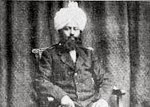The Prophet found little response in Mecca. At the time of Hajj the Arabs came to visit the Kaaba from different places. He went round their camps. He called each tribe to Islam. The Quresh had their men everywhere. No one heard him. He next turned to Taif. It was a big town, some sixty miles to the south-east of Mecca. He stayed there for ten days. He met the chiefs of the city. They all laughed at him. Abdial, the leading man of the town, told him to depart. Then he set the young men of the locality at him. They stoned the Prophet for three miles. Ten miles outside the town, the Prophet rested for a while in a garden. Rejected and forlorn, he prayed to God for help. Then an angel said to him,
"I would like to crush these people between two hills."
The Prophet told him,
"Nay, their children might yet worship the true God."
"There is something lofty and heroic in this journey of Muhammad to Al-Taif; a solitary man, despised and rejected by his own people, going boldly forth in the name of God, like Jonah to Ninevah, and summoning an idolatrous city to repent and support his mission. It sheds a strong light on the intensity of his belief in the divine origin of his calling." [Life of Muhammad, by Sir William Muir, pp. 112-113]
In the face of the bitter hostility, and in the midst of all his grief, the Prophet did not lose heart. He again went round the tents of the tribes who had come again on the annual Pilgrimage to the Kaaba. Abu Lahab and Abu Jahl were not far behind. They would warn people and say,
"Hear him not. He has given up his religion. He wants you to do the same."
The Prophet met there some tribesmen of Yasreb or Medina. They were six chiefs of Khazraj tribe. He read to them the Quran. He spoke to them of Islam. They had had heard the Jews of their town say that time was ripe for a Prophet to appear. They said to one another,
"Let the Jews not be the first to accept him."
The all became Muslims. They were Abu Amama, Asad bin Zarrara, Auf bin Haris, Rafi bin Malik, Qutba bin Amir, Uqba bin Amir and Jaber bin Abdullah.
At the time of the next Hajj five of these men came back from Yasreb. With them were seven more. Some belonged to the influential Aus tribe. They met the Prophet at Aqba, a hill outside Mecca. They embraced Islam at his hands. This is called the Baiat Aqba Ula - the first allegiance pact at Aqba. The Prophet sent them Musab bin Umair to teach them the Quran and the disciplines of Islam. Soon the new religion had many new followers in Yasreb (Medina). Saad bin Maaz, the chief of Aus, became a Muslim. His whole tribe followed him. Usaid, the chief of Abdul Ashhal, also accepted Islam.
More men came from Yasreb to meet the Prophet at the time of the next Hajj. The Prophet was now ready to leave Mecca. God had commanded him to go to Yasreb. Seventy men met him where they had met last year. The Prophet's uncle Abbas was present on the occasion. He said to the tribes of Yasreb,
"Muhammad is loved by his family. They have been with him through thick and thin. Now he wants to leave Mecca and go over to you. You will have to guard him well against every enemy. If you can, say so. If not, then say now straight."
Albaraa, an old chief, said,
"We would like to hear the Prophet."
The Prophet said,
"I only want you to guard me as you would guard your relations."
Albaraa took the hand of the Prophet in his own hand and said,
"By Allah, we shall guard you with our lives."
The Prophet then said,
"Your blood will be my blood. Your friends will be my friends. Your enemies will be my enemies."
Then Abbas bin Obada, chief of Yasreb, said to his men,
"Do you know what it means? You should be ready to fight every black or red and make every sacrifice."
They all answered,
"We know."
Prophet told them,
"They will have God's Paradise in return."
They answered,
"We agree, O Prophet of God, give us your hand."
The Prophet did. They all promised to obey him. This is called the Baiat Aqba Sani (the second allegiance pact at Aqba). The Prophet then chose twelve leaders from among them.
The Quresh came to know of this meeting. They made enquiries. They could get no proof but they were alert. The Prophet told Muslims to leave for Yasreb. Most of them went away. Only the Prophet, his family, Ali and some poor Muslims were left behind. The Quresh saw the Prophet was friendless. They thought they could finish him now, believing that Islam would then die soon. They met together and agreed to kill him. One man from each family was chosen for the job. These men were to attack the Prophet together. The Prophet's family would not fight back everyone, they believed. God commanded the Prophet to leave Mecca at once. He went straight to the house of Abu Bakr and told him that he had been ordered to depart for Medina.
"Will you not take me with you, O Prophet of Allah?"
asked Abu Bakr.
"I will,"
said the Prophet. Abu Bakr was moved to tears of joy. He said,
"I have two camels ready, one for each of us."
 Blog RSS Feed
Blog RSS Feed Via E-mail
Via E-mail Twitter
Twitter Facebook
Facebook
























0 comments:
Post a Comment
Note: Only a member of this blog may post a comment.